Curtain falls after 20 years of tackling tough issues
31 July 2023
After 20 years of performing the dramatised story of a troubled fictional family in schools throughout Aotearoa, the curtain has fallen on Everyday Theatre.
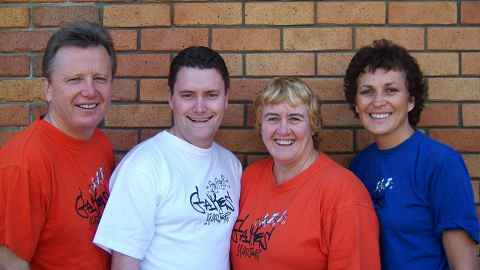
Focused on family violence prevention, Everyday Theatre, the creation of University of Auckland applied theatre experts Briar and Peter O’Connor, has called it a wrap after more than 2,500 performances to intermediate-aged children all over New Zealand.
The idea came out of a request from a social worker at the former Child, Youth and Family Service (CYFS) who was looking for ways to tackle the grim statistics on family violence with a community approach.
They wanted children and teachers to engage with difficult issues like family violence, neglect and child abuse in a safe context, and through a more entertaining medium than a lecture, says Dr Briar O’Connor.
“So we had the idea to create a performance that was structured like a video game, something kids could relate to [which eventually progressed to an augmented reality game called ‘The Family Game Reloaded’].
“After watching a short performance – which introduces the six characters and their dilemmas – a ‘games master’ facilitator invites the students to help the characters through four levels to finally achieve a full password and win the game.”
As experts in applied theatre (the use of theatrical forms in non-traditional theatre spaces to explore issues of concern to communities), and with years of teaching through drama in schools, the O’Connors were uniquely placed to devise something that had serious themes but was presented in an engaging and interactive way, using a range of dramatic conventions within the framework of a game.
After in depth consultation with CYFS, they came up with a story that has only slightly changed in 20 years.
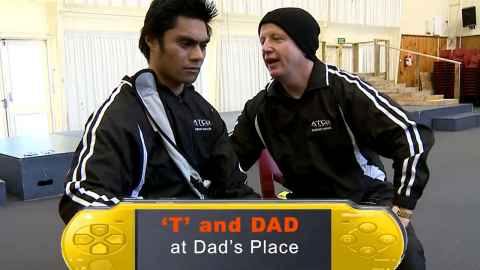
Central character 'T' (who can be of any gender) is being hit by their dad and is avoiding him by skipping school and spending time at mate Jack’s house. Meanwhile dad, usually out of work and addicted to computer games, has moved out of the family home and T’s mother’s new partner Brian has moved in with his clever daughter Becca, who helps T with homework; the audience soon finds out that T is bullying her into doing this.
The game requires the students to consider the perspectives of the victims and perpetrators of abuse, and of witnesses and bystanders; at first by watching the short performance, and later in their classrooms, where they discuss the issues and ask questions to progress up the levels, all the while led by the actors from the performance who ‘switch hats’ to become facilitators.
The full password earnt by playing all levels of the game is ‘Every child has hopes and dreams’, at which point the students are told they have won the game and have become games masters themselves.
Over the years, the O’Connors have both facilitated the regular performances and hired numerous teachers and actors, some of whom have gone on to have professional acting careers.
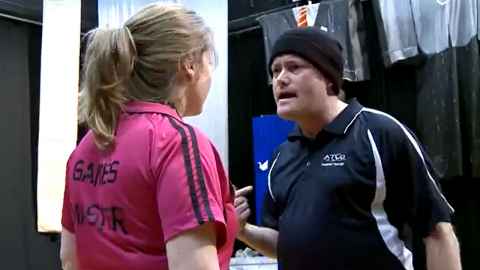
“Everyone involved has to undergo considerable training around recognising and responding to child abuse and have strong acting and facilitation skills before being let loose on schools,” says O’Connor.
The unique aspect of the session is how much it involved children in the discussion, she believes.
“We had seen similar things where the adults talked about the children, and the children were the central concept, but weren’t involved otherwise.”
She says the children almost unanimously connect with the character of T and their predicament, and during a section called ‘in the hot seat’, where the facilitator jumps back into character to answer students’ questions, Peter O’Connor, who was playing T at the time, was asked a heart-breaking question.
“A child asked Peter (as T) if he still loved his father, even though he hit him. T answered, ‘I don’t like what he does, but I still love him.’”
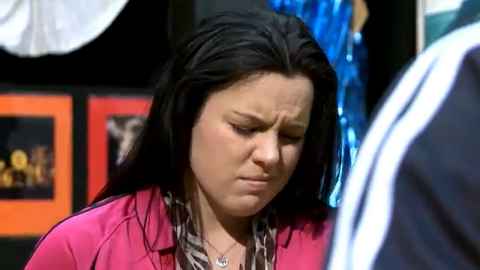
As well as being open about difficult issues in a non-threatening environment, Everyday Theatre has also created chances over the years for children to talk to someone about issues that might be similar to their own experiences, and for teachers to be part of that process, says O’Connor.
“There have been times when we’ve noticed a child not participating or hiding under a desk and those are often the ones where we’ll say to a teacher, ‘Follow that child up, find out what’s going on.’”
The focus of her PhD, how school staff learn and apply their obligations to child protection, was inspired by seeing first-hand the gaps that existed between, ‘I think there is a problem with such and such child’ and what then needs to happen about it, she says.
“Since the 2014 Children’s Act introduced measures with the intention of better protecting children from abuse and neglect, both in their homes and in the community, schools do have an obligation to notice and respond to child abuse, but teachers often don’t receive any training in how to do that properly and so it doesn’t happen.
“My argument has always been we need to clearly tell people what to do with the information children disclose to them.”
If there is message to take away from the performance, she says, it’s about being active.
“Bystanders who know what’s going on need to do something, and if you’re an adult, and you’re told something, you need to do something, and if you’re a child, don’t keep those secrets.”
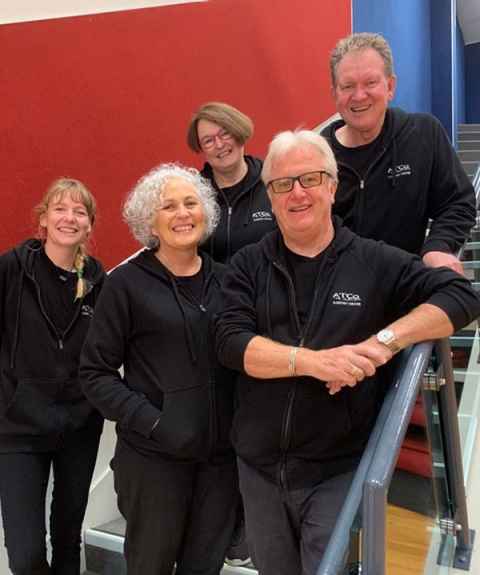
So it’s the end of an era and the O’Connors can look back with pride on a ground-breaking programme that has been invited to showcase at international conferences on applied theatre and community arts around the world, including in the UK, Ireland, Australia and Singapore.
“For many reasons, we’ve decided it’s time to finish Everyday Theatre, and 20 years with the same programme, from the same core funder, is an extraordinary feat for any education programme,” says Briar O’Connor.
“We’ve been so fortunate to hear young people talk about the importance of strong family relationships and question behaviours they see presented by the adults in the story.
“And we’ve witnessed so many young people develop empathy for others, but also realise that empathy doesn’t mean they have to excuse unwanted behaviours.”
She says over the years, young people have offered profound ideas to improve the situation for everyone in the story, children and adults alike.
“With careful scaffolding, young people are old enough to discuss difficult topics and fiction is a wonderful way to do this, so everyone remains safe. We hope participants will always remember, as we will, that every child has hopes and dreams.”
Media contact
Julianne Evans | Media adviser
M: 027 562 5868
E: julianne.evans@auckland.ac.nz